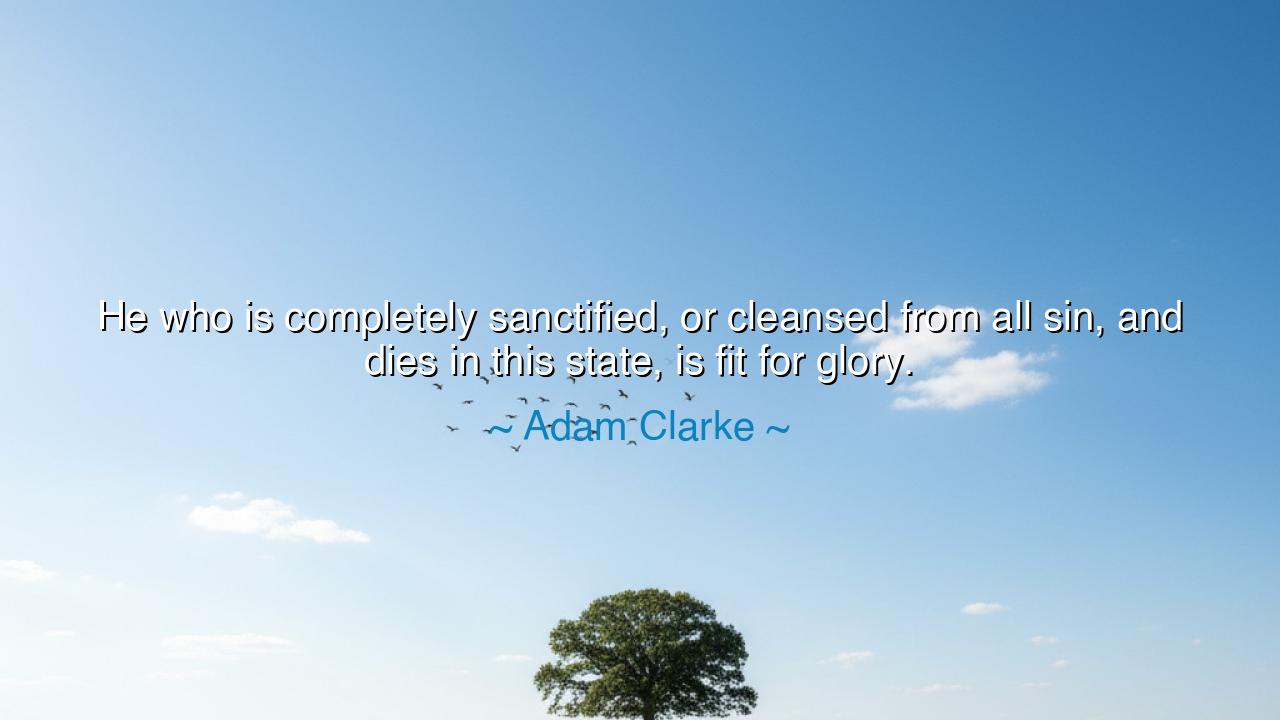
He who is completely sanctified, or cleansed from all sin, and
He who is completely sanctified, or cleansed from all sin, and dies in this state, is fit for glory.






“He who is completely sanctified, or cleansed from all sin, and dies in this state, is fit for glory.” — so wrote Adam Clarke, the great theologian and commentator of the Methodist tradition, a man whose life was devoted to the study of Scripture and the pursuit of holiness. His words are not merely doctrine; they are a vision of the soul’s final ascent, a glimpse into the mystery of sanctification — that sacred process by which the heart is purified, the will aligned with the divine, and the soul made ready to dwell in eternal glory.
The origin of this quote lies in Clarke’s lifelong study of the Bible and his faith in Christian perfection, a teaching central to early Methodism. Clarke believed, as did John Wesley before him, that sanctification was not a distant ideal, but a living reality — that the human heart, by grace and perseverance, could be freed from the dominion of sin even in this life. To be “cleansed from all sin” was not to be flawless in deed, but to be wholly devoted to God, with every motive and desire purified by love. For Clarke, the soul that reached this state of inward holiness, and died thus surrendered, entered not into judgment but into glory — for it had already been transformed into harmony with the divine.
To understand his meaning, one must see sanctification as the final refinement of the soul’s long journey. The human heart, like gold drawn from the earth, is filled with both beauty and impurity. Through the fires of trial, repentance, and faith, these impurities are burned away until only the pure metal remains. The one who endures this refining — who allows grace to do its perfect work — becomes radiant, transparent before God, fit not merely to be forgiven, but to be glorified. Thus, when Clarke speaks of dying “in this state,” he means the soul that has been fully reconciled to its Maker, bearing no shadow of rebellion, no stain of pride, but only the light of divine love.
Consider the example of John Wesley, founder of the Methodist movement, whose death was recorded by those who loved him as serene and victorious. His final words, spoken in a whisper, were, “The best of all is, God is with us.” Here was a man who had labored long, endured persecution, and lived wholly for others. Yet at his end, there was no fear — only peace, only glory. He had been sanctified through a lifetime of devotion and obedience, and in death, he passed not into darkness but into light. In him we see Clarke’s teaching embodied: the one who is cleansed from sin, whose heart is pure before God, meets death not as an enemy, but as the doorway to everlasting joy.
There is in this teaching both majesty and mercy. For Clarke does not say that sanctification is achieved by one’s own power, but by the grace of God working within the willing heart. Sin, though mighty, is not eternal; grace is stronger. The soul that yields itself daily to prayer, repentance, and love is steadily washed clean, as a river purifies the stone it carries. This process is neither swift nor easy — it is the refining of a lifetime. Yet the promise is sure: that the one who endures to the end, who surrenders wholly to divine will, will stand unashamed before the throne, fit for glory.
But there is another side to Clarke’s wisdom — a warning as much as an invitation. To die unpurified, to live half-heartedly, is to fall short of the life for which the soul was made. Many live without thought of sanctification, content to be forgiven but not transformed. Yet forgiveness is the beginning, not the end, of holiness. Clarke calls us beyond mere pardon into renewal, beyond religion into righteousness. The path of sanctification is not the way of comfort, but of cleansing — of dying daily to selfishness and rising daily in love. Only those who embrace this inner crucifixion are truly prepared for eternal glory, for they have already begun to live the life of heaven while still on earth.
Therefore, my listener, let this teaching sink deep into your heart. Do not wait for death to make you holy; seek sanctification now, while the breath of life still stirs within you. Begin each day with prayer for cleansing, end each night with repentance and gratitude. Let your words, your actions, and your thoughts be purified by the fire of love, until all within you belongs to God. For in the end, the measure of life is not its length, nor even its deeds, but its likeness to the divine. When the soul is free from sin and full of love, then — and only then — is it truly fit for glory.
And so, as Adam Clarke teaches, let the goal of every heart be not merely to die well, but to live pure. For death is no terror to the sanctified; it is but the final breath before the great awakening. The one who is cleansed of sin dies not as one leaving home, but as one returning to it. To such a soul, the gates of heaven swing wide, and the voice of God whispers, “Well done.”






AAdministratorAdministrator
Welcome, honored guests. Please leave a comment, we will respond soon